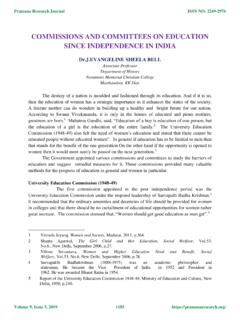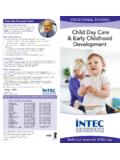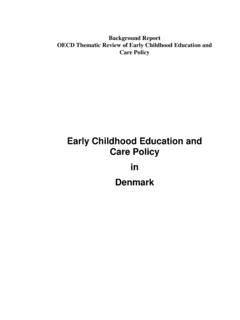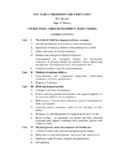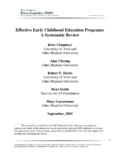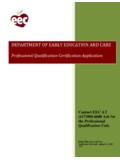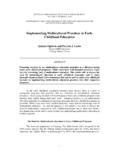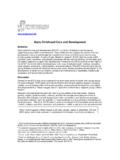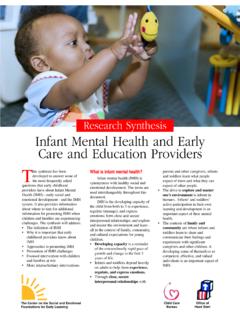Transcription of EARLY CHILDHOOD CARE AND EDUCATION IN INDIA
1 Management of Elementary EDUCATION i EDUCATION for All Mid-Decade Assessment EDUCATION FOR ALL MID DECADE ASSESSMENT EARLY CHILDHOOD care AND EDUCATION IN INDIA Venita Kaul Deepa Sankar NATIONAL UNIVERSITY OF EDUCATIONAL PLANNING AND ADMINISTRATION NEW DELHI EARLY CHILDHOOD care and EDUCATION EDUCATION for All Mid-Decade Assessment 2 NUEPA 2009 Published by National University of Educational Planning and Administration (NUEPA) (Declared by the Government of INDIA Under Section No. 3 of the UGC Act 1956) 17-B, Sri Aurobindo Marg, New Delhi - 110 016 Photo Credit Ravi Ramachandran, IRS The views expressed in the paper are those of the author and should not be attributed to NUEPA and the Government of INDIA .
2 Ii EARLY CHILDHOOD care and EDUCATION EDUCATION for All Mid-Decade Assessment 3 Preface The World EDUCATION Forum in Dakar, Senegal approved a comprehensive vision of EDUCATION for All (EFA) to be achieved by 2015 based on the six goals. The six goals relate to the areas of EARLY CHILDHOOD care and EDUCATION , universalising primary EDUCATION , gender, youth and adolescents, adult EDUCATION and quality of EDUCATION . The main focus is on reaching the unreached for ensuring complete coverage of EDUCATION . With this background the Mid- Decade Assessment of EDUCATION for All was initiated to take stock of the progress made with respect to EFA Goals. Corresponding to this exercise, a comprehensive review of the progress made with respect to EDUCATION for All in INDIA was conducted jointly by Government of INDIA and the National University of Educational Planning and Administration (NUEPA).
3 The present work which is a sequel to the National Report consists of a series of thematic and state review papers. There are nine thematic review papers covering all the six goals including three additional papers on three other themes, namely, Teacher and Teacher EDUCATION , Management Strategies for EFA and Financing of EFA in INDIA . These thematic review papers are further followed by a series of analytical papers covering progress of EFA in twenty seven states of INDIA . State reviews attempt to present a quick picture of the current level of progress in each state of INDIA assessing the magnitude of the task involved in achieving EFA goals and projecting a realistic time frame as well as strategies needed to reach the goals. Each thematic review as well as state-specific analytical review paper has been prepared by an established expert in the respective area/state in close collaboration with national and state governments.
4 The review papers along with the National Report present a comprehensive and disaggregated picture of the progress made towards EFA goals in the country. The papers are coming out at a very opportune time when the Parliament is engaged in debating the legislation to make EDUCATION for all children a Fundamental Right. While the thematic papers highlight state of development of EDUCATION with respect to different goals of EFA, the State papers present the diversity of the situation across the country. The whole series would serve as an invaluable independent documentation on various aspects of EFA ranging from EARLY CHILDHOOD care and EDUCATION to universal elementary EDUCATION and adult literacy programmes using authentic data sources accompanied by a review of relevant empirical research. The whole Project involving the National Report along with the series of thematic and state analytical review papers were conceived and executed by Prof.
5 EARLY CHILDHOOD care and EDUCATION EDUCATION for All Mid-Decade Assessment 4 R. Govinda, NUEPA who led the entire exercise and would like to thank him profusely for his leadership. Dr. Mona Sedwal who as a part of the Project Team at NUEPA contributed immensely to the whole exercise also deserves appreciation. The Team immensely benefited by the advice given by the Technical Advisory Group set up under the Chairmanship of Professor Sharma for guiding the entire exercise. I would like to express my sincere thanks and gratitude to Prof. A. K. Sharma for his invaluable guidance. Finally, I would also like to acknowledge the generous financial support provided by UNICEF and UNESCO. Ved Prakash Vice Chancellor National University of Educational Planning and Administration iv EARLY CHILDHOOD care and EDUCATION EDUCATION for All Mid-Decade Assessment 5 Editorial Note Indian Constitution directs the State to provide free and compulsory EDUCATION for all children upto the age of 14.
6 This goal has been pursued by the country for nearly six decades through successive development plans. The last two decades have witnessed significant improvements in children s participation in schooling, accompanied by substantial increase in investments. The recent effort to raise resources for the sector through imposition of an EDUCATION cess is major effort in that direction. Even though school EDUCATION has traditionally remained a subject for action by State Governments, Government of INDIA has, during the last two decades following the National Policy on EDUCATION 1986, begun to play a leading role. This culminated in the launching of the national programme of Sarva Shiksha Abhiyan in 2001. Despite all these efforts, the final goal of providing quality EDUCATION for all has eluded the country. Urgency of reaching the goal has been heightened in recent years due to several national and international developments, including commitments made under the Dakar Framework for Action for providing quality EDUCATION for All by 2015, which not only covers primary EDUCATION but also focus on literacy goals, gender equality and quality concerns.
7 The Dakar Framework of Action listed the following six specific goals to be achieved by all countries. 1. Expanding and improving comprehensive EARLY CHILDHOOD care and EDUCATION , especially for the most vulnerable and disadvantaged children. 2. Ensuring that by 2015 all children, particularly girls, children in difficult circumstances and those belonging to ethnic minorities, have access to and complete free and compulsory primary EDUCATION of good quality. 3. Ensuring that the learning needs of all young people and adults are met through equitable access to appropriate learning and life skills programmes. 4. Achieving a 50 per cent improvement in levels of adult literary by 2015, especially for women, and equitable access to basic and continuing EDUCATION for all adults. 5. Eliminating gender disparities in primary and secondary EDUCATION by 2005, and achieving gender equality in EDUCATION by 2015, with a focus on ensuring girls full and equal access to and achievement in basic EDUCATION of good quality.
8 6. Improving every aspect of the quality of EDUCATION , and ensuring their excellence so that recognized and measurable learning outcomes are achieved by all, especially in literacy, numeracy and essential life skills. The National Plan of Action for EDUCATION for All (2002) in INDIA reflects this sense of urgency felt within the country by proposing to reach the targets much ahead of the international dateline. At the national level, the Constitutional Amendment in 2002 declaring EDUCATION in the age group 6-14 which corresponds to the elementary EDUCATION stage of schooling a fundamental right has brought the issue of universal elementary EDUCATION (UEE) to the centre stage of public discourse. The country is in the process of drawing up the legislation for effective implementation of the right for EARLY CHILDHOOD care and EDUCATION EDUCATION for All Mid-Decade Assessment 6 translating the constitutional provision into reality.
9 With the progress made in recent years the goal seems to be achievable by the international time frame of 2015. But this requires systematic assessment of the various goals the present exercise is one such effort. UNESCO has been bringing out annual review of the progress made in moving towards the goal of EFA through the Global Monitoring Report. These assessments do not reflect an encouraging picture of the Indian scene. This is an issue of serious concern for the national leadership as one sixth of the world population lives in INDIA . With around 65% adult literacy rate, there are more around 350 million adult illiterates in the country. This should not be taken to imply that no efforts are being made to meet the challenge of EFA. Besides, the national averages do not fully reflect the diverse reality characterizing educational progress in INDIA . In fact, it is paradoxical that while certain pockets of the country are emerging as the international hub for creating a knowledge society, certain other regions and sections of the population continue to be deprived of even basic EDUCATION .
10 It is clear that in pursuing EFA goals, not all states and regions of the country are in the same league. The variety is too wide to draw any generalization. While some states have made remarkable progress in EDUCATION , practically eradicating illiteracy and achieving near universal participation of children in elementary EDUCATION , several other states continue to remain far from the final goal. What is needed to progress faster in moving towards the 2015 EFA deadline in all parts of the country? This obviously demands an analytical exercise - goal wise as well as statewise. It is with this objective in view that the present exercise was taken up to make an independent assessment of the progress achieved in different states and with respect to different EFA goals. The present series of papers constitute the outcome of such a comprehensive exercise carried out by independent experts, in collaboration with Central and State Governments.
